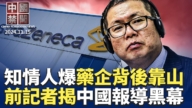【新唐人2013年04月12日讯】中共元老陈云长子陈元,发表重温中共前党魁江泽民1993年的文章。文中力捧江泽民亲自推动金融电子化,对遏制腐败发挥了重要作用等。但评论认为,这篇文章透露﹕共产党内部可能正在清算几近崩溃的金融系统,涉及了江泽民。还有消息说,陈元主管的“开发银行”近千亿贷款,目前陷入巨额债务。
4月11号,《人民日报》发表陈元的文章,陈元在文章中提到﹕1993年中国金融电子化水平十分落后,当时,现金的大量使用及体外循环,对居民造成诸多不便,而且带来逃税、漏税、走私、洗钱、腐败等违法、违规现象,扰乱了国家经济金融秩序。陈元表示,在这样的形势下,江泽民提出要实现金融管理电子化,这既有利于社会主义市场经济建设,也有利于法制建设、制度建设和反腐败斗争。
陈元文中力捧江泽民,说他开启了中国金融电子化发展的新时代。
政论家 伍凡: “中共的金融现状,已经处于破产的状态,崩溃的状态, 其中有一个很重要的现象,就是有一个资金外流,资金外逃,大批的钱跑到外国去了, 是用什么手段传的呢﹖你不可能用皮箱拎这么多钱啊﹗所以完全用电子,用电子化,用电子系统,用网路系统,把这个钱慢慢传出去了。”
美国的“中国社会民主党”中央委员会主持人刘因全指出,江泽民在中国历史上犯下了滔天罪行,面临的指责很多,陈元跳出来写这篇文章,是此地无银三百两,欲盖弥彰。
美国“中国社会民主党”中央委员会主持人 刘因全:“中国官员的腐败,最主要是从江泽民当政以后开始恶化,我们知道中国官员腐败的膨胀期、不可收拾,发展到非常恶劣的时期,就是江泽民时代,所以我认为,说江泽民推动什么东西制止腐败这是不对的,不符合事实的。”
据中共自己的统计:江泽民当政期间,从1994年至1996年,每年洗钱已近1,500亿﹔1997年至2000年,每年洗钱活动已达2,500亿至3,000亿元﹔2001年至2003年,每年高达4,000亿至5,000亿。而在2002年11月,江泽民交出中共总书记和国家主席那年,外汇非正常外流更是高达300亿美元。
伍凡:“我的感觉,现在共产党内部是不是正在清算贪污腐败涉及到金融系统, 清算到最后责任谁来负责?总要找个总头,谁开的头,现在点来点去是点到江泽民头上了,而陈元又来替江泽民讲好话,来替他打包票,讲的是相反的,现实是大批钱跑出去了,通过电子化系统跑出去了,所以这是一个现在共产党内部激烈斗争的一个表现。”
与陈元的文章相对应的是,中共政协前主席李瑞环在“两会”闭幕后,出版了一套名为《看法与说法》的四卷本著作,其中对中共政治、经济、文化的诸多论断,被指与习近平、李克强主政理念相同,最近更被大陆各大报章、网站争相推荐、节录。
伍凡分析认为,中共的任何一篇有份量的文章,都能反应出共产党内部斗争的现实状况。陈元的文章直接力捧江泽民,而李瑞环却是和江泽民唱对台戏。
伍凡:“你用蜻蜓点水骂两句话,或者是你跟江泽民唱对台戏,不解决任何问题, 共产党杀了那么多人,杀害法轮功,你能出来制止吗?你没有,你只不过不同意而已, 他这个东西,你说对习李有什么帮助?看不出来,不过可以对江泽民打两个耳光而已。”
李瑞环曾经是江泽民入选中共总书记时的劲敌,当年被江泽民逼退﹔而陈元则是中共太子党之一,有消息说,陈元主管的“开发银行”近千亿贷款,陷入了信贷危机。
Jiang Zemin’s Guilt Further Unveiled
Chen Yuan, the son of Chen Yun, one of the Chinese
Communist Party’s veterans, recently published an article in support of Jiang Zemin.
Chen’s article praised Jiang’s promoting of
electronic systems in the financial sector,
this has played a big role in curbing corruption.
Political observers think Chen’s article signals the CCP may be
rectifying the crumbling financial system, which involves Jiang.
Reportedly, China Development Bank headed by Chen Yuan
has been mired in debt of nearly 100 billion yuan.
On April 11, the People’s Daily published an article,
authored by Chen Yuan.
The article said, China was backward in financial
computerization in 1993.
In the same period, abundant use of cash daily caused
many inconveniences and breaches of law.
These included tax evasion, smuggling,
money laundering, corruption, among others.
These disrupted China’s economic and financial order.
In this situation, Jiang Zemin sought to electronify the
the nation’s financial management system.
Since this would be good to build the legal infrastructure,
and for the fight against corruption.
Chen Yuan praised the fact that Jiang Zemin had opened
a New era of China’s financial electronification.
(Critc) Wu Fan: “The CCP’s financial situation
has been on the brink of collapse.
An important sign is outflows of a large amount
of money to overseas.
How did they make it? Entirely through the electronic system.”
Liu Yinquan, chair of China Social Democratic Party,
comments.
Jiang Zemin has committed heinous crimes and
is facing some very heavy accusations.
Chen Yuan’s article only makes Jiang’s guilt
more conspicuous.
Liu Yinquan: “In China, officials’ corruption
became worse under the reign of Jiang Zemin.
If someone says that Jiang Zemin helped curb corruption,
I think it cannot be the truth.”
The CCP official data lists the amounts of money
laundered under Jiang Zemin’s rule.
In 1994-1996: nearly 150 billion yuan yearly;
In 1997-2000: 250-300 billion yuan yearly;
In 2001-2003: 400-500 billion yuan yearly.
In November 2002, Jiang Zemin retired as the
CCP general secretary and state president,
the non-normal cash outflow at that time reached
a value of 30 billion US dollars.
Wu Fan: “I think that the CCP’s anti-corruption effort
may have touched the financial sector.
Who will bear the blame? That’s the initiator.
So finally Jiang Zemin has become the focus.
Now Chen Yuan has stood up to back Jiang Zemin,
but is speaking the opposite of the truth.
The fact is that large sums of money have been
transferred abroad through the electronic system.
So I think it is a sign that the CCP’s infighting
will become more intense.”
In contrast, Li Ruihuan, former head of CCP Political
Political Consultative Conference, recently released
a four-volume set, “Views & Remarks.”
Some of his comments were on CCP politics,
economy and culture.
These were deemed similar to views held
by Xi Jinping and Li Keqiang.
Many major Chinese newspapers and web portals
have published excerpts of these articles.
Wu Fan says that any important CCP article mirrors
The reality of its infighting.
Chen Yuan’s article piled it on for Jiang Zemin,
whilst Li Ruihuan has set himself up against Jiang.
Wu Fan: “His remarks against Jiang are light reprimands,
which cannot truly play a big role.
The CCP has killed so many Chinese people.
When it killed Falun Gong practitioners,
did you stand up to stop it?
No, you didn’t. You just disagreed.
So are his articles going to help Xi-Li? I don’t see it,
but his comment really slaps Jiang Zemin’s face.”
Reportedly, Li Ruihuan was Jiang Zemin’s then
opponent for the post of CCP general secretary.
He was later driven off the political stage by Jiang.
Chen Yuan is the CCP princeling.
Media have reported that under the helm of Chen Yuan,
China Development Bank has been mired in a credit crisis,
involving nearly 100 billion yuan in loans.




























